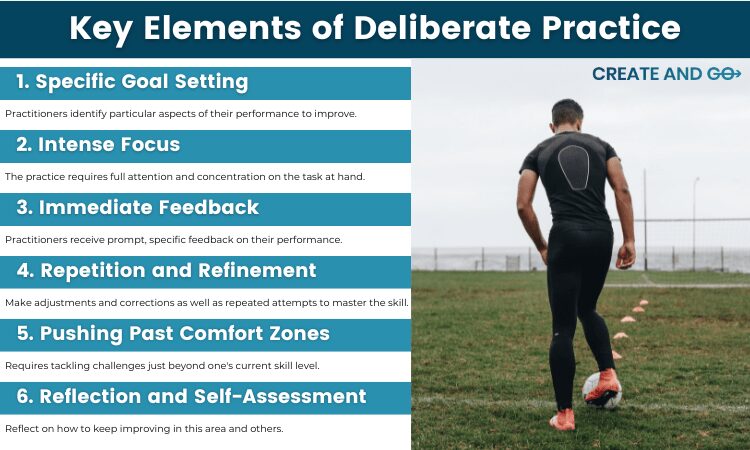Ever feel like you’re running on a never-ending treadmill in your business, constantly chasing success but not quite reaching it?
But what if there was a way to break free from this cycle and truly level up your game?
Enter deliberate practice – your new secret weapon.
Now, I know what you’re thinking: “Oh great, another buzzword to add to my already overflowing plate.” But stick with me here, because this isn’t just another flashy concept.
Deliberate practice is the real deal, and it’s been quietly powering the success of top performers across industries for years. It’s not just about putting in more hours; it’s about working smarter, not harder.
In this article, we’ll explore what deliberate practice really is, why it matters, and how you can use it to transform your skills and skyrocket your business success.
Let’s dive into the world of deliberate practice and discover how it can revolutionize your entrepreneurial journey.
What is Deliberate Practice?
Deliberate practice is a highly structured and purposeful approach to skill development, designed to improve specific aspects of performance through repetition and refinement.
Coined by psychologist Anders Ericsson, deliberate practice goes beyond simple repetition or mindless rehearsal. It’s a focused, systematic method of training that pushes individuals to continuously improve their skills and overcome weaknesses.
Key principles of deliberate practice include:
- Specific goal-setting: Practitioners identify particular aspects of their performance to improve.
- Intense focus: The practice requires full attention and concentration on the task at hand.
- Immediate feedback: Practitioners receive prompt, specific feedback on their performance.
- Continuous repetition and refinement: Based on feedback, make adjustments and corrections as well as repeated attempts to master the skill.
- Pushing beyond comfort zones: Deliberate practice often involves tackling challenges just beyond one’s current skill level.
- Self-assessment and reflection: Take time to analyze what worked and what didn’t and make improvements with each repetition.

Deliberate practice is distinct from regular work or play. While work focuses on delivering results and play on enjoyment, deliberate practice prioritizes improvement above all else.
It’s often described as demanding and not inherently enjoyable, requiring significant effort and concentration.
This method has been shown to be effective across various fields, including music, sports, medicine, education, and business.
For the business world, deliberate practice can be a powerful tool for honing specific skills crucial to success, such as writing, public speaking, product development, or marketing strategies.
- What is Deliberate Practice?
- The Science Behind Deliberate Practice
- Why Deliberate Practice Matters
- Key Principles of Deliberate Practice for Business Success
- Applying Deliberate Practice in Different Business Areas
- Overcoming Challenges in Implementing Deliberate Practice
- Tools and Techniques for Effective Deliberate Practice
- Case Studies: Successful Entrepreneurs and Creators Who Use Deliberate Practice
- Creating a Deliberate Practice Plan for Your Business
- FAQs About Deliberate Practice
- Conclusion
The Science Behind Deliberate Practice
Deliberate practice isn’t just a theoretical concept; it’s backed by solid scientific evidence that explains why it’s so effective in improving performance.
The science behind deliberate practice primarily revolves around neuroplasticity and the way our brains adapt to focused, repetitive training.
Neuroplasticity and Skill Acquisition

Neuroplasticity refers to the brain’s ability to reorganize itself by forming new neural connections throughout life. When we engage in deliberate practice, we’re essentially rewiring our brains.
This process involves:
- Strengthening neural circuits: Repeated practice of a specific skill strengthens the neural pathways associated with that skill, making the execution of the skill more efficient over time.
- Myelination: This process involves the insulation of nerve fibers, which speeds up and refines the transmission of neural signals. Deliberate practice accelerates myelination, leading to faster and more precise skill execution.
Through deliberate practice, individuals develop what’s known as “adaptive expertise” – the ability to apply skills flexibly in new and complex situations.
The Role of Focused Attention
Deliberate practice requires intense focus, which activates specific areas of the brain associated with the skill being practiced. This focused attention:
- Enhances cognitive control: It improves our ability to ignore distractions and maintain concentration on the task at hand.
- Facilitates memory consolidation: Focused practice helps transfer information from short-term to long-term memory, making skills more ingrained and accessible.
Feedback and Performance Improvement
The immediate feedback loop inherent in deliberate practice is crucial for rapid skill improvement. This feedback:
- Activates error-detection mechanisms in the brain, allowing for quick corrections and adjustments.
- Stimulates the release of neurotransmitters that promote learning and memory formation.
Pushing Beyond Comfort Zones
Deliberate practice often involves working at the edge of one’s abilities, which:
- Triggers stress responses that, when managed properly, can enhance learning and performance.
- Promotes neurogenesis (the formation of new neurons) in areas of the brain associated with learning and memory.
Seeing progress is not just about putting in hours; it’s about engaging in a process that fundamentally changes our brain structure and function to support expert-level performance.
Why Deliberate Practice Matters
In the fast-paced, ever-evolving world of online business and content creation, deliberate practice isn’t just beneficial—it’s essential.
Here’s why it matters so much.
Accelerated Skill Development
In an environment where new platforms, tools, and trends emerge constantly, the ability to quickly acquire and master new skills is invaluable. Deliberate practice allows you to:
- Rapidly improve specific skills crucial to your business, such as writing, video editing, or data analysis.
- Stay ahead of the curve by efficiently learning and adapting to new technologies and market changes.
Enhanced Creativity and Innovation
Contrary to popular belief, creativity isn’t just about innate talent. It’s a skill that can be developed. Deliberate practice:
- Helps you break through creative blocks by providing structured approaches to ideation.
- Enables you to combine existing skills in novel ways, leading to innovative solutions and unique content.
Improved Problem-Solving Abilities
Everyone in the business world faces unique challenges daily. Deliberate practice:
- Sharpens your analytical skills, allowing you to tackle complex problems more effectively.
- Builds a repertoire of strategies you can apply to various business situations.
Increased Productivity and Efficiency
Time is a precious commodity for busy entrepreneurs and creators. Deliberate practice:
- Helps you identify and eliminate inefficiencies in your work processes.
- Improves your focus and concentration, allowing you to accomplish more in less time.
Better Decision-Making Skills
In business, the quality of your decisions can make or break your success. Deliberate practice:
- Enhances your ability to analyze situations and make informed choices quickly.
- Improves your intuition and “gut feel” for business decisions through repeated exposure to similar scenarios.
Stronger Resilience and Adaptability
The entrepreneurial journey is often filled with setbacks and unexpected changes. Deliberate practice:
- Builds mental toughness, helping you bounce back from failures more quickly.
- Improves your ability to adapt to new situations and pivot when necessary.
Continuous Improvement and Growth
In a competitive landscape, standing still means falling behind. Deliberate practice:
- Instills a mindset of continuous improvement, keeping you and your business evolving.
- Helps you set and achieve increasingly challenging goals, driving long-term success.
Differentiation in a Crowded Market
With millions of creators and entrepreneurs vying for attention, standing out is crucial. Deliberate practice:
- Allows you to develop unique skills and perspectives that set you apart from competitors.
- Helps you consistently produce high-quality work that attracts and retains an audience.
In a world where change is the only constant, deliberate practice provides the tools to not just keep up, but to lead the pack and define your own success.
Key Principles of Deliberate Practice for Business Success
Applying deliberate practice to business requires adapting its core principles to the entrepreneurial context.
Here are the key elements to focus on:
1. Set Specific, Challenging Goals

Vague objectives like “improve my writing” or “grow my business” aren’t enough. Instead, create SMART goals that:
- Break down broad skills into specific, measurable components.
- Set concrete goals for each component, such as “increase email open rates by 10%” or “reduce product development time by 20%.”
- Ensure goals are challenging but achievable to maintain motivation.
2. Focus on Technique and Process
Instead of fixating solely on outcomes:
- Break down complex business tasks into their constituent parts.
- Identify the specific techniques that top performers in your field use.
- Practice these techniques deliberately, focusing on perfecting each element.
3. Obtain Immediate Feedback
Feedback is crucial for identifying areas of improvement and tracking progress:
- Implement systems for gathering real-time data on your performance.
- Seek honest feedback from mentors, peers, and customers.
- Use analytics tools to measure key performance indicators (KPIs) relevant to your goals.

4. Engage in Consistent, Structured Practice Sessions
Deliberate practice isn’t about putting in more hours, but about making those hours count:
- Schedule regular, focused practice sessions for specific skills.
- Structure these sessions with clear objectives and methods.
- Minimize distractions during practice time to maintain deep focus.
5. Push Beyond Comfort Zones
Growth happens when you challenge yourself:
- Regularly take on tasks that are slightly beyond your current abilities.
- Embrace discomfort as a sign of potential growth.
- Identify and target your weakest areas for improvement.
6. Reflect and Self-Assess
Regular reflection enhances the learning process:
- After each practice session or project, take time to analyze what worked and what didn’t.
- Keep a journal to track your progress and insights over time.
- Use this reflection to inform your future practice and business strategies.
Remember, deliberate practice is about quality over quantity, and consistent effort over time. It’s not always enjoyable in the moment, but the long-term results can be transformative for your business success.
Applying Deliberate Practice in Different Business Areas

Deliberate practice can be applied across various aspects of your business. Here are few examples that cover a wide range of different business practices.
Content Creation
Whether you’re writing blog posts, creating videos, or producing podcasts:
- Break down your content creation process into specific skills (e.g., headline writing, storytelling, editing).
- Practice each skill separately, focusing on improvement in targeted areas.
- Analyze top-performing content in your niche and practice emulating successful elements.
- Seek feedback from your audience and peers on specific aspects of your content.
Marketing and Branding
To enhance your marketing efforts:
- Practice writing compelling ad copy or social media posts in timed sessions.
- Experiment with different marketing strategies, measuring results meticulously.
- Regularly analyze successful campaigns in your industry, identifying key elements to incorporate into your practice.
- Role-play customer interactions to improve your brand messaging and communication.
Product Development
For those creating physical or digital products:
- Break down the development process into stages and practice each stage individually.
- Set time constraints for brainstorming sessions to enhance creativity under pressure.
- Regularly seek user feedback and practice incorporating it into product iterations.
- Study successful products in your niche and practice reverse-engineering their features.
Customer Service and Relationship Building
To improve your interactions with clients and customers:
- Role-play different customer scenarios, focusing on problem-solving and communication.
- Practice active listening techniques in both personal and professional conversations.
- Analyze recordings of your customer interactions, identifying areas for improvement.
- Set goals for response times and satisfaction rates, and practice meeting these consistently.
Business Strategy and Planning
To sharpen your strategic thinking:
- Practice creating business plans or strategies within tight time constraints.
- Regularly analyze case studies of businesses in your industry, practicing decision-making based on their scenarios.
- Use simulation tools or games that mimic business environments to practice strategic thinking.
- Set aside time for “strategy sprints” where you focus intensively on solving specific business challenges.
Leadership and Team Management
For those managing teams or aspiring to leadership roles:
- Practice giving clear, concise instructions or feedback in simulated scenarios.
- Regularly reflect on your leadership decisions and their outcomes, identifying patterns and areas for improvement.
- Practice active listening and empathy in your daily interactions, both personal and professional.
- Set specific goals for team performance and practice strategies to achieve them.
Financial Management
To improve your business’s financial health:
- Practice creating and analyzing financial reports under time pressure.
- Regularly forecast your business finances and compare predictions to actual results.
- Practice making financial decisions based on case studies or simulated scenarios.
- Set specific financial goals and practice strategies to achieve them in your business.
Remember, the key to effective deliberate practice in these areas is to:
- Identify specific skills within each domain.
- Set clear, measurable goals for improvement.
- Practice consistently with full focus and effort.
- Seek immediate feedback and adjust your approach accordingly.
- Regularly reflect on your progress and refine your practice methods.
By applying deliberate practice across these various business areas, you can develop a well-rounded skill set that propels your business forward. The beauty of this approach is its flexibility – you can adjust your focus as your business needs evolve, ensuring continuous growth and improvement in the areas that matter most to your success.
Overcoming Challenges in Implementing Deliberate Practice
While deliberate practice is a powerful tool for improvement, implementing it in your business or creative pursuits can come with its own set of challenges.
Here’s how to overcome some common obstacles:
Time Management and Prioritization
Challenge: Finding time for deliberate practice amidst busy schedules. Solutions:
- Schedule dedicated practice time in your calendar, treating it as non-negotiable.
- Start with short, focused sessions (even 15-20 minutes) and gradually increase the duration.
- Identify low-value activities in your routine and replace them with deliberate practice.
Maintaining Motivation and Focus
Challenge: Staying motivated when progress feels slow or practice becomes monotonous. Solutions:
- Set clear, achievable milestones to track progress.
- Vary your practice routines to keep things interesting.
- Connect your practice goals to your larger business or creative vision.
- Find an accountability partner or join a community of like-minded professionals.
Dealing with Plateaus and Setbacks
Challenge: Overcoming periods of stagnation or apparent lack of progress. Solutions:
- Recognize plateaus as normal parts of the learning process.
- Reassess your practice methods and consider changing your approach.
- Seek feedback from mentors or peers to identify blind spots.
- Use setbacks as learning opportunities, analyzing what went wrong and how to improve.
Balancing Practice with Other Business Responsibilities
Challenge: Integrating deliberate practice without neglecting other crucial business areas. Solutions:
- Align practice goals with immediate business needs to create synergy.
- Use time-blocking techniques to ensure both practice and core business activities get attention.
- Delegate or outsource tasks where possible to free up time for skill development.
- Look for ways to incorporate deliberate practice into your daily work routines.
Lack of Clear Feedback Mechanisms
Challenge: Obtaining actionable feedback to guide improvement, especially in solo ventures. Solutions:
- Establish objective metrics to measure your performance.
- Seek out mentors or join professional groups for expert feedback.
- Use customer feedback and market response as indirect measures of improvement.
- Regularly record and review your own performance (e.g., recording sales calls, analyzing writing samples).
Overcoming the Discomfort of Pushing Boundaries
Challenge: Pushing yourself beyond comfort zones, which is essential for deliberate practice. Solutions:
- Start with small, manageable challenges and gradually increase difficulty.
- Reframe discomfort as a sign of growth rather than failure.
- Practice self-compassion and celebrate efforts, not just outcomes.
- Use visualization techniques to mentally prepare for challenging practice sessions.
Avoiding Burnout
Challenge: Maintaining a sustainable practice routine without overexertion. Solutions:
- Balance intense practice with adequate rest and recovery time.
- Incorporate variety in your practice to engage different skills and maintain interest.
- Set realistic expectations and avoid comparing your progress to others.
- Regularly reassess and adjust your practice goals to ensure they remain challenging yet achievable.
By addressing these challenges head-on, you can create a sustainable and effective deliberate practice routine that drives long-term growth in your business and creative endeavors.
Tools and Techniques for Effective Deliberate Practice
- Time-blocking and Scheduling Methods: Use digital calendars or productivity apps to schedule dedicated practice sessions. Implement techniques like the Pomodoro Method for focused intervals.
- Feedback Systems and Performance Tracking: Use project management software, spreadsheets, or analytics tools to measure performance and track progress on specific skills or projects.
- Mentorship and Coaching: Seek out mentors in your industry through networking events or online platforms. Consider joining mastermind groups or hiring a personal coach for tailored guidance.
- Skill-Specific Practice Exercises: Engage in targeted exercises relevant to your field, such as writing prompts for authors, mock campaigns for marketers, or recorded presentations for public speakers.
- Technology and Apps for Deliberate Practice: Utilize spaced repetition apps like Anki, AI tools for instant feedback, and business simulation software to enhance your practice.
- Reflection and Self-Assessment Tools: Keep a practice journal, use mind-mapping tools to visualize progress, and implement regular self-assessment quizzes or checklists.
- Habit-Building Techniques: Use habit-tracking apps, implement the “Don’t Break the Chain” method, and create a dedicated practice space to reinforce consistent practice.
- Peer Review and Collaboration Platforms: Engage with platforms like GitHub for coding, join writing workshops or critique groups, and participate in online forums focused on skill development in your field.
Remember to experiment with these tools and techniques to find the most effective combination for your specific goals and learning style.
Case Studies: Successful Entrepreneurs and Creators Who Use Deliberate Practice
Deliberate practice has been a key factor in the success of many renowned entrepreneurs and creators. Here are some notable examples:
- Bill Gates: The Microsoft co-founder is known for his “Think Weeks,” where he isolates himself to read, reflect, and strategize. This deliberate practice of focused learning and thinking has been crucial to his business insights and decision-making.
- Oprah Winfrey: Oprah consistently hones her interviewing skills through deliberate practice. She prepares meticulously for each interview, reviews her performance, and constantly seeks ways to improve her questioning techniques and audience engagement.
- Mark Zuckerberg: The Facebook founder sets annual personal challenges for himself, such as learning Mandarin or reading a book every two weeks. These challenges are forms of deliberate practice that push him out of his comfort zone and develop new skills.
- Elon Musk: Musk is known for his intense work ethic and continuous learning. He deliberately practices problem-solving across various disciplines, which has been key to his success in diverse industries like electric vehicles, space exploration, and renewable energy.
- Warren Buffett: The legendary investor spends about 80% of his working day reading and thinking. This deliberate practice of continuous learning and analysis has been fundamental to his investment strategies and business acumen.
- Jerry Seinfeld: The comedian famously used a calendar method where he marked each day he wrote jokes, creating a chain he didn’t want to break. This deliberate practice of consistent writing helped him refine his craft.
These case studies demonstrate that deliberate practice is not just about putting in hours, but about structured, focused effort to improve specific skills
Creating a Deliberate Practice Plan for Your Business
Implementing deliberate practice in your business requires a structured approach.
Here’s how to create an effective plan:
- Identify Key Skills: Determine the specific skills crucial for your business success. These might include marketing, product development, leadership, or financial management.
- Set Clear, Measurable Goals: For each skill, establish concrete objectives. For example, “Increase email open rates by 15% in 3 months” or “Reduce product development time by 20% within 6 months.”
- Break Down Skills into Components: Divide each skill into smaller, manageable parts. For instance, if improving public speaking, focus on body language, voice modulation, and content structure separately.
- Design Focused Practice Sessions: Create specific exercises for each skill component. These should push you slightly beyond your current abilities.
- Establish a Regular Schedule: Allocate dedicated time for your practice session. Consistency is key, so aim for daily or weekly sessions, even if they’re short.
- Seek Expert Feedback: Arrange for mentors, coaches, or peers to provide regular, honest feedback on your performance.
- Measure and Track Progress: Use analytics tools, performance metrics, or personal assessments to monitor how you’re improving performance over time.
- Reflect and Adjust: Regularly review your practice plan. What’s working? What isn’t? Be prepared to modify your approach based on results and feedback.
- Stay Motivated: Connect your practice goals to your larger business vision. Celebrate small wins to maintain enthusiasm.
- Create a Supportive Environment: Set up your workspace and schedule to minimize distractions during practice sessions.
Stay committed to the process, and you’ll see significant improvements in your business skills over time.
FAQs About Deliberate Practice
Conclusion
Deliberate practice is more than just a buzzword—it’s a powerful tool that can transform your business and your life.
You’re not just working harder; you’re working smarter, more efficiently, and with greater purpose.
Throughout this article, we’ve explored the definition of deliberate practice, why it matters, and how to implement it in various aspects of your business.
We’ve seen how successful entrepreneurs and creators have used this technique to achieve extraordinary results.
The key takeaways are:
- Deliberate practice is about focused, intentional effort to improve performance and specific skills.
- It requires setting clear goals, obtaining immediate feedback, and consistently pushing beyond your comfort zone.
- When applied to business, it can accelerate skill development, enhance creativity, and improve problem-solving abilities.
- While challenges exist, they can be overcome with the right strategies and tools.
Remember, the path to mastery is not about innate talent or luck—it’s about consistent, purposeful practice.
By creating an extensive deliberate practice plan tailored to your business needs, you’re setting yourself up for long-term success and continuous improvement.